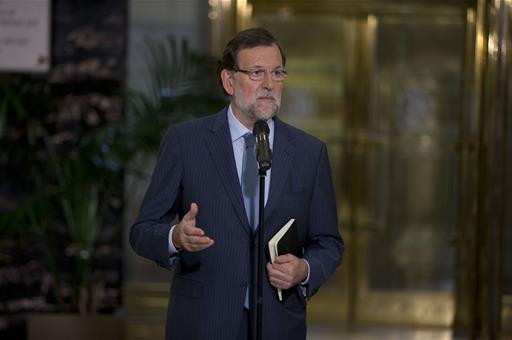"We will not rest on our laurels, but will continue to take decisions", says Mariano Rajoy
President's News - 2015.9.14
Lower House of Parliament, Madrid
Mariano Rajoy insisted, after meeting with the PP parliamentary groups in the Upper and Lower Houses, that the general elections will not be brought forward, something which, in his opinion, is "very positive" for the interests of the people of Spain as a whole.
"We will not rest on our laurels, but will continue to take decisions", he asserted. The President of the Government added that there are still many laws to pass through Parliament and that in the coming months the Council of Ministers will continue to adopt important resolutions, as it did at the last meeting in relation to public servants.
Approval of Budget in October
Among the key issues in the final leg of the legislature, Mariano Rajoy underlined the parliamentary debate on the General State Budget for 2016, which is expected to be passed into law during the month of October.
This decision, he said, is "sensible" and "reasonable" and "transmits a positive message both within Spain and abroad", since it allows a "game plan" to be set out. He remarked that this will thus enable pensioners and public servants to know how much they will receive as from January, and regional governments and local authorities to see how much revenue they can expect.
As regards the content of the Draft Budget, Mariano Rajoy declared that it maintains the economic policy "that has served to overcome the worst of the economic crisis, although there is still a lot to do". He also highlighted that the public accounts for the coming year contain a rise in pensions and in salaries of public servants, and they allocate more than 53% to social issues and invest in "two headings that are decisive for the future of Spain": R&D+i and student grants.
Comprehensive asylum policy
Mariano Rajoy remarked that the European Union must adopt a global and comprehensive approach towards the phenomena of asylum and immigration on economic grounds. In his opinion, it is not only a question of resolving a temporary situation, such as that of the Syrian refugees, but rather of getting to the heart of the matter and resolving it.
The President of the Government asserted that Spain will attend Monday's meeting of the Justice and Home Affairs Council meeting which will decide on the future of the Syrian refugees with a "constructive attitude" and in support of the proposal from the European Commission. He also considers that the international community must make an effort to resolve the problem of Syria "as swiftly as possible".
On the issue of asylum, Mariano Rajoy considers that the European Commission should clearly set out which countries' nationals this right should apply to, and establish common legislation in all EU Member States.
In terms of immigration on economic grounds, the President of the Government requested a cooperation plan with those African countries that immigrants are coming from. "It is clear that if people cannot live a dignified life in their own country they will leave. And they leave at the risk of their own lives and of many other things", he argued.
He also called for a joint plan between the countries of origin and the EU to fight mafias engaged in people trafficking and to establish readmission agreements in order for immigrants that arrive in Spain at the hands of these mafias to be immediately readmitted to their countries of origin.
Consolidate the recovery
The President of the Government included among the main targets for the remaining months of the legislature, "the consolidation of the economic recovery" and "explaining the decisions that have been adopted". Mariano Rajoy pointed out that, after several years of decline, GDP rose last year and that in 2015 Spain will post the highest growth of the main economies in the European Union.
As regards employment, he quoted the latest figures for the EU, according to which Spain is the country where most jobs were created between the first quarter of 2014 and the first quarter of 2015. He placed special emphasis on the fact that only Germany is ahead of Spain in the creation of permanent employment contracts in the last year.
Among the positive economic data, Mariano Rajoy also mentioned the increase in tax revenue of 6% - which stood at 12% in the case of SMEs - on the previous year, and the rise in credit: 55% in the case of consumption, 71% for housing and more than 20% for SMEs. "We carried out a very complex restructuring of our entire financial sector and this is starting to bear fruit", he stressed.
The President of the Government argued that the challenge of reaching 20 million people in work in Spain "is within our grasp, provided that we maintain the economic policy that has proved to be successful and allowed us to overcome the worst crisis we have seen in our country for decades, by laying solid foundations for the future of our economy, and hence for the future and well-being of the Spanish people".
Catalonia
Mariano Rajoy acknowledged that "many people" attended the pro-independence demonstration held on 11 September on the occasion of the National Day of Catalonia, but underlined that "there were a great many more people" who did not attend.
In this regard, he highlighted that those citizens who did not attend cannot be disregarded because a governor must work for both those people who are like-minded and for those who are not, and take into account the opinion of those attending and those absent.
He also pointed out that three regional elections have been held in Catalonia in the last five years, and asserted that those promoting a break-away are not explaining to citizens that abandoning Spain means the loss of rights as both Europeans and Spaniards.





